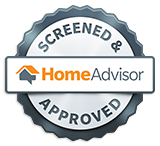Paying attention to the air quality in your Bountiful, Utah home is critical. When indoor air quality (IAQ) is low, people often contend with fatigue, recurring headaches, eye discomfort, and many other unpleasant symptoms. A low IAQ can also exacerbate chronic respiratory ailments, such as asthma, allergies, and COPD. The good news is that there are several easy and inexpensive ways to improve your IAQ. Here are five top tips:
1. Change Your Air Filters Regularly
Changing your HVAC air filter on a regular basis is essential. Not only does this preserve your IAQ, but it also protects your heating and cooling equipment from excessive wear. If you use your HVAC system every day, you should change the filter once every one or two months. You should change it monthly if:
- You have one or more pets in the home
- Someone in the home suffers from chronic respiratory ailments
- You live near a busy street or freeway
- Your property isn’t fully landscaped
- You live near an active construction site
When changing your HVAC air filter, consider the benefits of upgrading to an option that has a higher maximum efficiency reporting value (MERV) rating. The standard filters included with HVAC equipment are intended to block particulates that harm HVAC systems. Conversely, higher-rated filters are designed to block smaller-sized contaminants known to have negative impacts on human health.
In addition, it’s necessary to clean all air registers throughout the home and to pay attention to air filters in other appliances. For instance, you should have your dryer vent cleaned annually. You should also clean or change the filter in your vacuum cleaner according to the manufacturer’s instructions. Even taking good care of your hood range vent will help your IAQ. Staying on top of these maintenance tasks will ensure that airborne contaminants have plenty of ways to get out of the home or be filtered out of your indoor air.
2. Have Your HVAC Air Ducts Cleaned and Inspected
HVAC air ducts can trap lots of dirt and debris that bypass air filters. Harmful particulates can also enter HVAC systems via old, leaky air ducts and loose or damaged duct seals. Much like filter changes, You should schedule duct cleaning services on a regular basis. The general recommendation for HVAC air duct cleaning is once every three to five years. However, if risk factors such as household pets, unlandscaped grounds, and lots of nearby traffic exist, you should consider scheduling duct cleaning services once every two to three years instead.
When you have a professional inspect and clean your HVAC air ducts, it ensures that issues are noticed and resolved quickly. When ducts are leaky, then dirty and unfiltered air constantly enters the home. Identifying and repairing these leaks will improve your IAQ and lower your home energy bill. It can also extend the lifespan of your HVAC equipment.
3. Seal Up Air Leaks
In an efficient home, all the air circulated throughout the building is first moved through a high-quality air filter. If you have leaky windows, loose doors, and gaps or cracks in building materials, this allows unfiltered outside air into the structure, negatively affecting your IAQ. Exhaust fumes, dirt, lint, mold, pollen, and other contaminants constantly flow into the living environment through these imperfections. In addition, conditioned air flows out, and substantial energy is wasted. You can have weatherstripping installed, upgrade your windows, and use caulk or other materials to seal these leaks and improve your IAQ.
4. Practice Good Pet Maintenance
Taking good care of your household pets is an often-overlooked part of protecting and improving your IAQ. Establish a solid schedule for grooming services, and brush your cats and dogs regularly between visits. Brushing minimizes shedding and allows you to collect and dispose of any pet hairs that come off during the process.
If you have pets and carpeting, taking good care of your flooring is a must. Consider investing in a vacuum that has a high-efficiency particulate air (HEPA) filter. Remember that carpets act as air filters by trapping dirt, dander, pet hairs, and many other particulates. Thoroughly vacuum your carpets at least once each week, and have them professionally cleaned approximately once every six months.
5. Invest in Integrated HVAC System Accessories
Many indoor air quality issues are the result of excess or insufficient humidity. Having the right balance of indoor humidity can prevent dry eyes, mold problems, respiratory ailments, and other negative consequences. Unfortunately, establishing and maintaining this balance isn’t always easy. Although HVAC systems are designed to regulate both indoor temperatures and indoor humidity, certain factors can compromise their effectiveness. For instance, if you have several people living under the same roof, lots of humid air is added to your home by steamy baths and showers, moisture-generating cooking projects, and general indoor activities. In some instances, this extra moisture exceeds the limited humidity regulating abilities of HVAC systems.
If you have a highly efficient home, sometimes referred to as a “tight envelope,” your HVAC system might not run long enough to extract excess humidity. Although having a highly efficient home is definitely a good thing, it lowers your demand for heating and cooling. This means that furnaces and air conditioners don’t cycle on as often in these environments, and they frequently cycle off before humidity regulation is complete. When this happens, it can leave people with homes that have comfortable indoor temperatures but often feel muggy or clammy at the same time. In these instances, having a whole-house humidifier or dehumidifier installed by a professional is often the best choice.
In other cases, humidity is hardly the only indoor air quality concern. There are multiple ways to improve IAQ with integrated equipment to address specific issues. You might want to consider investing in a media filter, a HEPA filter, or an air scrubber if there is:
- Anyone in the home with a compromised immune system
- A high level of airborne contaminants just outside of your home
- A history of mold or mildew problems within your home
Integrated HVAC accessories are installed directly within HVAC air ducts. These secondary appliances work seamlessly with heaters and air conditioners so that consumers can enjoy balanced humidity, comfortable indoor temperatures, and higher indoor air quality.
Every home has its own unique range of IAQ concerns. Although certain integrated accessories work well in multiple environments, for best results, it’s important to get customized IAQ solutions. While the capabilities and benefits of having a media filter installed might sound good, a licensed HVAC technician may find that the best choice for your home lies in humidity regulation. Your living environment might even require a multi-pronged IAQ plan that involves multiple HVAC accessories working together.
For more than 20 years, Blue Best Plumbing, Heating, Air, Generators has been providing reliable heating and cooling services to residents of Bountiful, Utah and the surrounding area. We also offer fireplace installation, preventative maintenance agreements, and indoor air quality services. If you need professional help improving your home’s indoor air quality, call Blue Best Plumbing, Heating, Air, Generators today!








